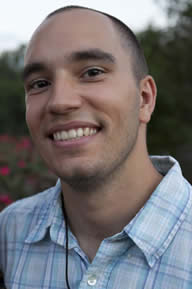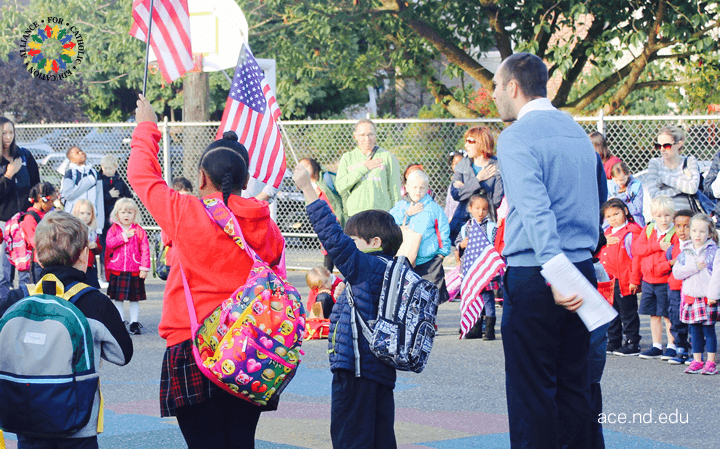Matt DeBoer, a graduate of the 12th cohort of the Mary Ann Remick Leadership Program, begins each morning by shouting, "God is good!" to his 140 students at St. Therese Catholic Academy. He receives a raucous reply of "All the time!" "And all the time," he continues. "God is good!" they finish emphatically. This call and response officially begins the school day, and it also illustrates a schoolwide commitment to Christian values. The remainder of their morning assembly fosters a sense of unity and purpose, and it constructs a clear spirit through prayer and reflection. No visitor could deny the sense of Christocentric culture that is on display here, but it is something that was missing from the school as recently as 2014.
 Matt's road to St. Therese was by no means conventional. He first fell in love with education as a member of the Jesuit Volunteer Corps serving in New Orleans. JVC placed Matt at the Good Shepherd School, where he would ultimately spend six years teaching and serving in various leadership roles. Even during his first year of service, his principal noticed his potential and recommended he consider school leadership someday. His extreme dedication to students and their learning led Matt to take on the role of assistant principal, and he also applied to the Remick Leadership Program, through which he hoped to develop his administrative abilities.
Matt's road to St. Therese was by no means conventional. He first fell in love with education as a member of the Jesuit Volunteer Corps serving in New Orleans. JVC placed Matt at the Good Shepherd School, where he would ultimately spend six years teaching and serving in various leadership roles. Even during his first year of service, his principal noticed his potential and recommended he consider school leadership someday. His extreme dedication to students and their learning led Matt to take on the role of assistant principal, and he also applied to the Remick Leadership Program, through which he hoped to develop his administrative abilities.
While he loved Good Shepherd, Matt nonetheless began to realize that it was time to move on to a school where he could more abundantly share his gifts. Matt wanted to work at a place that was looking to rebuild its Christian identity and in which he could work closely with staff, parents, and students to build a vibrant community. This search led him to St. Therese in Seattle, where he became the fifth principal in six years.
When he took the job as principal of St. Therese, Matt's first goal was to create a school environment that made all feel welcome and at home, no matter who that person was. The majority of student St. Therese serves are non-Catholic, which only placed a greater need for Matt and his staff to "live the [Catholic] faith in a way that [was] inviting and not exclusive," he says. Just as important to this goal of community, Matt also wanted to develop an intentional focus on Christ.
"When you have a small community, you should not be praying over an intercom, you should look each other in the eyes and hold hands when you pray."
Through his work in the Remick Leadership Program, Matt developed a toolkit of strategies that would help him develop the kind of community that all students deserve. Chief among these was the value of an intentional morning assembly. Previously, students at St. Therese would begin the day by going straight to their rooms at the sound of a bell and starting the lessons for the day. The pivot to a morning assembly shortened the amount of instructional time, but Matt believed it would improve the quality of the teaching for all involved. As he says, "When you have a small community, you should not be praying over an intercom, you should look each other in the eyes and hold hands when you pray."
To enact this vision, though, Matt needed the support of his faculty and staff. Without his teachers' backing, the morning assemblies would not be successful. In order to earn the support of his staff, Matt knew that he himself would need to lead the charge. If he missed morning assemblies to take phone calls or send emails, then why should his teachers be fully present? Matt thus spent his mornings outside the school greeting parents and students as they arrived on the campus. His persistence received the respect required to start actualizing this vision of a distinctly Christ-centered community.
Besides simply forcing the school to spend time together, Matt sought to root their work in Christ. He grounds himself in the Philippians verse, "I can do all things through Christ who strengthens me," which became a motto for the entire school in his first year. Because of his own relentless use of this phrase, the school now recites it at the end of each morning and afternoon assembly. These are the last words students say in unison before departing for their respective homes each day. Finding and implementing Christian practices that meant something to the students and faculty bridged the gap between forced community and genuine spiritual connections.
"Emphasizing Christ added a gravity to what occurred at St. Therese since they strove to develop good humans, not just good thinkers."
Emphasizing Christ added a gravity to what occurred at St. Therese since they strove to develop good humans, not just good thinkers. Through this building process, Matt realized the complementary nature of an open school culture and Christian values–each cultivated and informed the other. While it is possible to treat these as independent entities, combining them into one larger target added to its power to transform the ethos of the school.
Now entering his fourth year as principal, Matt has continued to use and adapt the morning assembly and realizes that their success is not a foregone conclusion. Students now participate in a discussion of a daily saint or hear a reflection from the FaithND app, but the goal of fostering a Christ-centered community remains the same. When he arrived, the school had 112 students. Today, St. Therese has 142 students from 32 different zip codes in the Seattle area and is statistically the most diverse school in the archdiocese. For Matt DeBoer, Christian school culture means celebrating those differences and finding a common ground on which to stand.
 Alliance for Catholic Education
Alliance for Catholic Education
